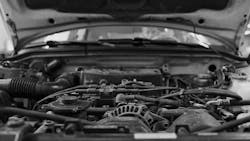Editorial: The best approach for engine replacement
If a customer’s engine has seen better days and needs to be rebuilt or replaced, you have several options. Which option is best? That depends largely on availability and cost. Depending on current engine condition and year/make/model, choices may include rebuilding the engine in-house, having the engine rebuilt by a local engine machine shop, buying a reclaimed (i.e. salvage yard) engine, buying a new replacement engine from the automaker or buying a remanufactured engine from an independent remanufacturer.
Depending on the specific engine and its current condition, you may opt to perform a rebuild in-house. Of course, this depends on having a tech who is comfortable with this task. In addition, once the engine is torn down, it’s important to verify the condition of key components — block, crankshaft, connecting rods, cylinder heads. This may dictate the need for block deck resurfacing, cylinder over-boring/honing, cylinder head reconditioning, condition of crankshaft main and rod journals, condition of the connecting rods, etc.
If machine work is needed, since your shop may not be equipped with the necessary equipment, you may need to farm this work out to a local engine shop. Once all machine work has been done, one of your techs may/should be able to reassemble and install the crank, bearings, pistons and rods, cam(s), heads, timing system, oil pump, intake manifold, etc. This approach will take some time, especially considering the local engine machine shop’s lead time. If the customer is comfortable with a potentially long timeframe (which could easily involve as much as a month or so, depending on various factors), this may be a viable option.
Another option is to turn the engine over to a local engine shop and let them handle the entire task (engine disassembly, cleaning, inspection, reconditioning and assembly). Once the engine is done, your shop performs the installation to the vehicle. Again, this can result in a lengthy time period, as most of today’s quality engine machine shops/engine builders seem to be slammed with work, so don’t be surprised if you face a lengthy delay.
Buying a used engine from a salvage yard is sometimes viable but this comes with a degree of risk. Depending on circumstance, maybe all you really need is a good shortblock, if you plan to re-use the existing heads, intake, water pump, etc. Or maybe you need a longblock (shortblock with heads). In either case, the condition of the engine is obviously critical. You certainly don’t want to waste your customer’s money and your reputation by installing an engine that is plagued with problems. Low-mileage used engines may seem attractive at first glance, but this is dependent on how the engine was maintained by the previous owner (maybe they never changed the oil). Unless you can obtain a limited “warranty” from the salvage yard as to the engine condition, it’s up to you to pull the heads and the oil pan to perform a cursory inspection. Cost-wise, buying a salvage engine may be the most attractive price option in the eyes of the vehicle owner, but it’s up to you to make sure that the used engine will be reliable.
Depending on the year of the vehicle, a fresh shortblock or longblock may be available from a local automaker’s dealership. This may, again, depending on the automaker, involve a brand new engine or a factory rebuilt engine. I hate to keep using the phrase “depending on”, but there are variables. A “new” engine (short or long block) will likely be a tad on the expensive side, but depending on stock availability, you may be able to obtain the engine in a matter of a few days. A factory reman engine should include a reasonable warranty.
An option to consider is to purchase a remanufactured engine from a reputable engine remanufacturer. Notice that we’re not referring to “rebuilt,” which might involve only a cleanup and replacing a few parts and/or minimal machining. A quality remanufactured engine will provide a product that has been 100% inspected and reconditioned, correcting any issues that retired the original core. As long as an established and reputable remanufacturer does the work, the final product may actually be better than when the engine was when newly made, as any slightly out-of-tolerance issues will likely be corrected. A quality remanufacturer usually provides a limited warranty — maybe one year and 10,000 miles. (This is only an example.)
When a customer has an issue that can’t be solved by parts replacement alone and requires a freshening-up or total replacement, you have choices. No engine replacement will be cheap, but in addition to cost, the vehicle downtime is a major consideration. Obtaining a ready-to-go reman engine is often the best bet.
About the Author
Mike Mavrigian
Motor Age Editor
Mike Mavrigian has written thousands of automotive technical magazine articles involving a variety of specialties, from engine building to wheel alignment, and has authored more than a dozen books that crisscross the automotive spectrum. Mike operates Birchwood Automotive, an Ohio shop that builds custom engines and performs vintage vehicle restorations. The shop also features a professional photo studio to document projects and to create images for articles and books.

